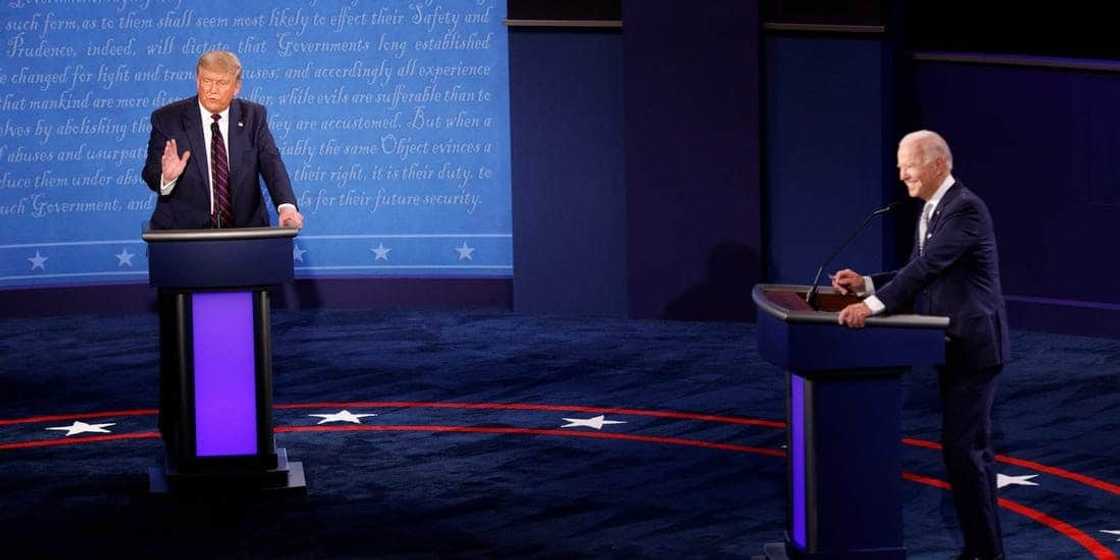Trump vs Biden: How winner of US presidential election will emerge
Briefly.co.za compiled an explainer on how the winner of the 2020 US election will be determined, a system vastly different from that in South Africa.
PAY ATTENTION: Click “See First” under the “Following” tab to see Briefly.co.za News on your News Feed!
As the US prepares for the November 2020 presidential election, Briefly.co.za explains in this piece how a winner will emerge between President Donald Trump of the Republican Party and Joe Biden of the Democratic Party, as documented by Reuters.

Source: UGC
Electoral College
Instead of the majority vote system used in Nigeria, the US uses a system called Electoral Collage to determine the winner of its presidential election.
Under the system, "electoral votes" are allotted to 50 states in the country and the District of Columbia based on their population.
The system is a product of compromise between the nation’s founders who argued on whether the president should be picked by Congress or through a popular vote.
How the Electoral College works
There are 538 electoral votes to be won. To win the election, a candidate must secure 270 electoral votes.
Please note the US election also includes popular votes, though it does not determine the winner.
A popular example is the 2016 election where Hillary Clinton won the popular vote but lost the electoral votes to President Donald Trump.
The Electors
In the US election, electors refer to party loyalists who pledge to support the candidate who gets the most (popular) votes in their state.
These are the people Americans, technically, cast their votes for, not the presidential candidates themselves.
Each elector represents one vote in the Electoral College.
In all the US states except Maine and Nebraska, the candidate that wins the most votes gets all of their electoral votes.
However, there are controversial instances where electors go against the rule and vote for the candidate who failed to win the popular votes in their states.
Some states have laws that penalise any elector who votes for a candidate who did not win the popular votes while there are still agitations that such votes should be cancelled.
Individual states have the freedom to change how their electors are chosen.
How the electors’ votes are counted
According to the US law, the electors are to meet in their respective states and send their votes to Congress on “the first Monday after the second Wednesday in December.”
Congress will consider a state’s result to be “conclusive” if it is finalized six days before the electors meet.
Those votes are officially tallied by Congress three weeks later and the president is sworn in on January 20.
What happens if there is a tie?
When the two candidates both get 269 votes each, the House of Representatives will decide the fate of the presidency, with each state’s votes determined by a delegation.
Is this system widely accepted by all Americans?
The electoral college system has many critics who are of the opinion that it thwarts the will of the people.
They cited instances where a candidate who wins the popular vote is denied the presidency because he or she lost the electoral votes.
The Republican Party has benefited at least twice from this system. One is the 2000 presidential election where George W. Bush won despite losing the popular vote.
Another instance which is more popular is that of President Trump in 2016.
While the Democrats may favour abolishing the electoral college system, the Republicans who have benefitted from it may not have a similar stance.
Sadly, the process of abolishing the system is complex. It requires two-thirds approval from both the House and Senate and ratification by the states, or a constitutional convention called by two-thirds of state legislatures.
Earlier, Briefly.co.za saw it was reported that the presidential candidate of the Democratic Party, Biden, highlighted the crucial role the African American community can play in the election.
The former US vice president said that in terms of voting, "The African American community can determine this election." Biden also stressed the importance of voting in the black community and how it is important to safeguard against voter suppression.
In another report, President Trump has rejected a virtual option for the second presidential debate with the former vice president and Democratic challenger, Biden.
Enjoyed reading our story? Download BRIEFLY's news app on Google Play now and stay up-to-date with major South African news!
Source: Briefly News


